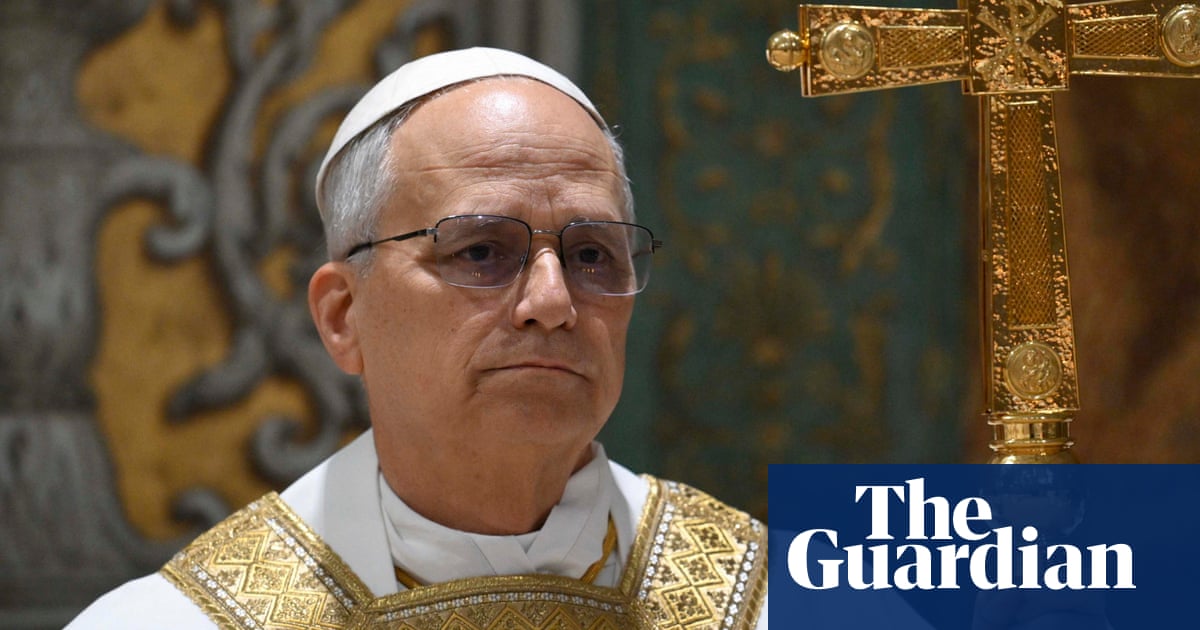What is the position ofPope Leo XIVon the issues that face him and the Roman Catholic church?
Within hours of his election as the 267th pontiff, Leo was being talked about as a bridge builder, a pope that would continue in Francis’s footsteps but without alienating traditionalists in the way his predecessor sometimes did. He is “known for solid judgment and a keen capacity to listen, and someone who doesn’t need to pound his chest to be heard”, according to arecent profile on Crux, a Catholic news website. He is “more pragmatic, cautious and discreet than the late pope”, it added.
In his first appearance on the balcony of St Peter’s Basilica, he wore traditional papal attire, signalling that his style will be more formal than Francis’s, who opted for a simple white cassock for his first balcony appearance.
Although he is expected to follow Francis in many respects, he is likely to do so in a more emollient manner than his predecessor. In his opening remarks as pontiff, Leo said: “We have to be a church that works together to build bridges and to keep our arms open.” He will try to be a symbol of greater unity in the church.
Nevertheless some conservative cardinals and bishops in the US may bridle at his earlier criticisms of Donald Trump and his inclination towards a progressive, inclusive position. One of Trump’s most prominent Catholic allies, Steve Bannon, called Leo the “worst pick for Maga Catholics”, deeming him the “anti-Trump pope”.
In his years working in Peru, Leo – then Robert Prevost – acquired a reputation as a moderating influence among the country’s ideologically disparate bishops. He will need to draw on that to hold together the different factions of the global church.
Leo’s theology is focused on the poor and marginalised, following his predecessor’s priorities. He has been critical on social media of harsh immigration policies. As pontiff, his language is expected to be less confrontational than Francis’s, but he is likely to endorse the same priorities rather than seek to roll back the late pope’s legacy.
One indication is his view on the role of bishops, expressed while serving as head of the Vatican’s ultra-powerful Dicastery for Bishops for the past two years. A bishop is “not supposed to be a little prince sitting in his kingdom but rather called authentically to be humble, to be close to the people he serves, to walk with them and suffer with them”, he told Vatican News last year.
Leo has spoken out on the need for urgent action on the climate crisis, aligning with Francis’s environmental priorities. He has stressed the church must move “from words to action” and warned against the “harmful” consequences of unchecked technological development. “Dominion over nature” should not become “tyrannical”,he said last year. It must be a “relationship of reciprocity”.
Leo is expected to want the Vatican’s diplomats to be involved in efforts to end conflicts, principally in Ukraine, Gaza and South Sudan. His first words as pontiff to the world were “peace be with you all” and he called for “a disarmed peace and a disarming peace”.
Prevost was accused of “disregarding allegations” of abuse against two priests in Peru, and has “a history of resisting disclosure of abuse information to the public”, according to the survivors’ organisation BishopAccountability.
Over the past two years, when he headed the Dicastery for Bishops, he oversaw cases of bishops accused of abuse and its cover-up, said Anne Barrett Doyle, a co-director of BishopAccountability. “He maintained the secrecy of that process, releasing no names and no data. Under his watch, no complicit bishop was stripped of his title.”
As Pope Leo, he must “win the trust of victims and their families”, she added.
According to theCollege of Cardinals reporton him, Leo’s supporters “stress his innocence and say the cases have been inaccurately and unfairly reported in the media”. They insist he followed proper procedures in the case of two Peruvian priests accused of molesting girls.
The issue of sexual abuse and its cover-up is likely to dog Leo’s papacy as it did Francis’s. Although Francis came to a better understanding of the scale of the crisis in the church, survivors say he did not take enough concrete action and they will be watching Leo closely.
In recent years, Prevost has largely kept a low profile on the issues of sexuality and identity. In 2012, he expressed concern that western news media and popular culture promoted “sympathy for beliefs and practices that are at odds with the gospel”, specifically referencing the “homosexual lifestyle” and “alternative families comprised of same-sex partners and their adopted children”.
Last year, he neither endorsed nor rejected blessings for same-sex couples, saying there were cultural differences across the globe, with some countries still criminalising same-sex relationships.
LGBT+ Catholics Westminster, a UK-based campaign group, said: “Opinions and ideas can change … He has expressed openness to marginalised groups, though his stance on specific issues remains ambiguous, including the concerns of LGBT+ Catholics.”
In October 2023, Prevost said that “clericalising women” – ordaining them –would not solve the church’s problemsand might even create new ones. “The apostolic tradition is something that has been spelled out very clearly, especially if you want to talk about the question of women’s ordination to the priesthood,” he said.
But, he added: “I think there will be a continuing recognition of the fact that women can add a great deal to the life of the church on many different levels.”
In 2022, he appointed three women to aid him in his job advising on the selection of bishops.
